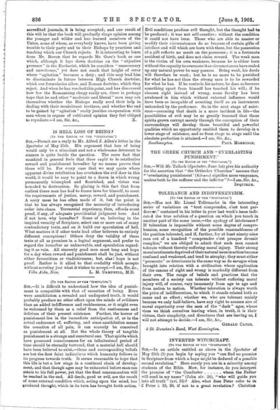[TO THE EDITOR OF THE "SPNOTATOR."1
Sra,—It is difficult to understand how the idea of punish- ment is compatible with that of cessation of being. Even were annihilation a revealed and undisputed truth, it would probably produce no other effect upon the minds of evildoers than an added indifference and recklessness, or it might even be welcomed by them as a relief from the restlessness and delirium of their present existence. Further, the horror of punishment lies in the immediate anticipation of, or in the actual endurance of, suffering, and since annihilation means the cessation of all pain, it can scarcely be conceived as punishment at all. But the whole theory of tangible punishment is a strange and unnatural one. 'That spirits which have possessed consciousness for an infinitesimal period of time should be eternally tortured, that a material hell should have been believed to exist,—these and corresponding beliefs are but the first faint indicatives which humanity follows in its progress towards truth. It seems reasonable to hope that this life is but a low stage in a continual chain of develop- ment, and that though ages may be exhausted before man can attain to his full power, yet that the final consummation will be reached in the end. All deeds, good or evil, are the result of some external condition which, acting upon the mind, has produced thought, which in its turn has brought forth action.
Evil conditions produce evil thought, but the thought had to be produced; it was not self-creative; without the condition it could not have been. Those who are able to master or modify their circumstances do so because of certain gifts of intellect and will which are born with them, but the possession of a gift reflects no merit on the possessor ; it is a fortunate accident of birth, and does not claim reward. The weak man is the victim of his own weakness, because he is either born without the capacity to overcome it or circumstances have sealed up any natural power he may possess. Being weak, his deeds will therefore be weak ; but, he is no more to be punished for what he has not than the strong man is to be rewarded for what he has. If he controls his nature, he does so because something apart from himself has touched his will; if he chooses right instead of wrong, some faculty has been awakened in him which without external influence would have been as incapable of asserting itself as an instrument untouched by the performer. So in the next stage of exist- ence—assuming that death is a mere incident in life—the possibilities of evil may be so greatly lessened that those spirits grown corrupt merely through the corruption of their surroundings will develop those beautiful and powerful qualities which no opportunity enabled them to develop in a lower stage of existence, and so from stage to stage until the absolute perfection is attained.—I am, Sir, &ea






































 Previous page
Previous page